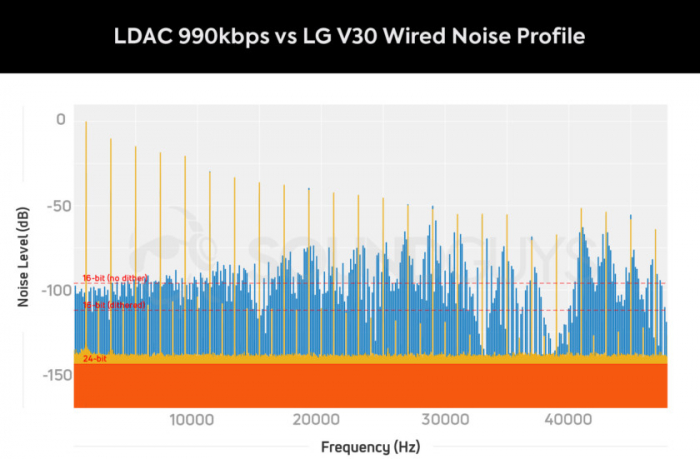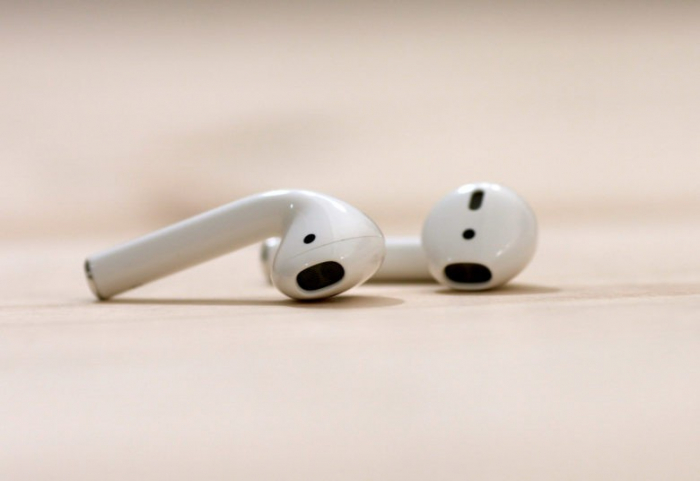Testing done for our sister site SoundGuys confirmed it’ll get you 90 percent of the way there — but not everybody is willing to accept the excuses behind ditching the headphone jack. Since USB Type-C headphones aren’t where they need to be, we have to examine the consumer audio technology’s performance in a world where the headphone jack is disappearing.
The findings
A more in-depth description of the testing process and findings can be found here, but here are the broad strokes:
1. Every single Bluetooth codec has measurable quality issues, though not all significant.
2. Not a single codec or set of Bluetooth headphones available can meet wired signal quality.
Bluetooth audio has come a long way since its noisy beginnings, but it’s still not ready to replace the headphone jack. However, most people won’t be able to hear the difference if they’re older than 24, have some form of noise-induced hearing loss, or are in the presence of outside noise. For this reason, Bluetooth headphones are best for those commuting, or in noisy situations. If you’re listening primarily at home — or in a quiet area — get a set of wired headphones.
By using an aggressive psychoacoustic model of compression like MP3 compression, AAC seeks to cut data where you wouldn’t normally be able to hear it anyway, but it’s sometimes a little too aggressive.
AirPods may be trendy, but they have significant sound quality problems.
AAC has some advantages when it comes to latency, but we recommend avoiding this on Android phones if you care about audio quality. SoundGuys found high levels of noise, and lower than average frequency cutoffs — both unacceptable to audiophiles and younger listeners. Though the sound isn’t as bad as some may say, the shortcomings are noticeable to the human ear at normal listening volumes. In this light, wireless earbuds using AAC like the Apple AirPods aren’t ideal for Android phone use.
Pay close attention to what codec your true wireless earbuds use, as well.

Unlike with other codecs, AAC test signals from Android phones like the Huawei P20 Pro, LG V30, and Samsung Galaxy Note 8 all vary wildly. Though we can’t definitively say why each Android device seems to handle AAC encoding differently, we suspect some of the power saving features baked into the Android ecosystem’s varying hardware affect audio playback. Nowhere is this more apparent than Huawei’s power-sipping P20 Pro, which seems to cut out at around 14.25kHz. Our best guess is Android phones differ in how they handle task scheduling in the CPU, which has consequences for battery life and also fixes audio skipping problems with Bluetooth. AAC doesn’t hit the maximum range of audibility in any of the phones tested.
LDAC is the only codec that truly attempts the hi-res thing, but it has perplexing issues with common phones. The bitrate defaults differ wildly from model to model. The Samsung Galaxy Note 8 and LG V30 both default to 660kbps, and the Google Pixel 3 defaults to the lesser 330kbps. However, you can change this in developer settings.
The new Sony WH-1000XM3 uses LDAC as its main Bluetooth codec, but you might not be getting the best they have to offer.
Despite big promises from Bluetooth’s only Hi-res codec, the standard doesn’t really deliver, and it falls short with its basic 330kbps setting. Both the 660kbps and 990kbps connections offer decent quality, but the 330kbps setting has a lot of noise, and a comparatively poor frequency response with higher-def content — you probably won’t hear it, though. We recommend using 660kbps as a good middle ground between quality and connection quality.

If you’re over the age of 24, Bluetooth headphones are more than likely good enough for you. Most people older than that cannot hear the audible effects of Bluetooth — outside of AAC’s shortcomings, and a certain level of noise.

Every single Bluetooth codec out there exhibits a higher level of noise than wired audio, though only AAC, SBC, and LDAC 330kbps exhibit audible noise. Where wired audio can handle CD audio and 24-bit music, Bluetooth headphones simply can’t, though 24-bit is dramatic overkill anyways. If you like your music loud, Bluetooth will be noisier than wired listening, depending on how high you crank it.
Of the tested codecs we met, aptX and aptX HD fared the best out of all our candidates. While that may seem strange to say, on the whole their results were right where they needed to stand in for a wire for commuters and listeners over 40. You’ll really only run into issues at high volumes (more than 90dB), so while aptX can’t quite keep up with CD quality, aptX HD gets extremely close to the mark with a little processing creativity. Both codecs fall short in the highest frequencies a human could potentially hear, but the vast majority of people can’t hear sounds over 18kHz anyway.
However, that software processing can’t fix noise issues in high notes. For best results you should listen at volumes below 90dB. Any higher and you’ll hear noise above 1kHz.
Before you ask: no, that’s not very quiet.
Good enough for most people, but not for everyone
Bluetooth headphones and earphones like the Apple AirPods may be good enough for most people, but it’s not good enough for everyone, and that’s a problem. While the benefits of high-bitrate music are largely academic, some flaws with Bluetooth audio prevent it from replacing the 3.5mm TRRS plug in all contexts. It’s a more expensive, less effective solution.
If you’re looking for commuting headphones, they’re great. Music lovers listening in a quiet environment will want something with a wire. Not only will it be cheaper, but it’ll work better too.
Read the original article on androidauthority.com.
More about: headphones
















































